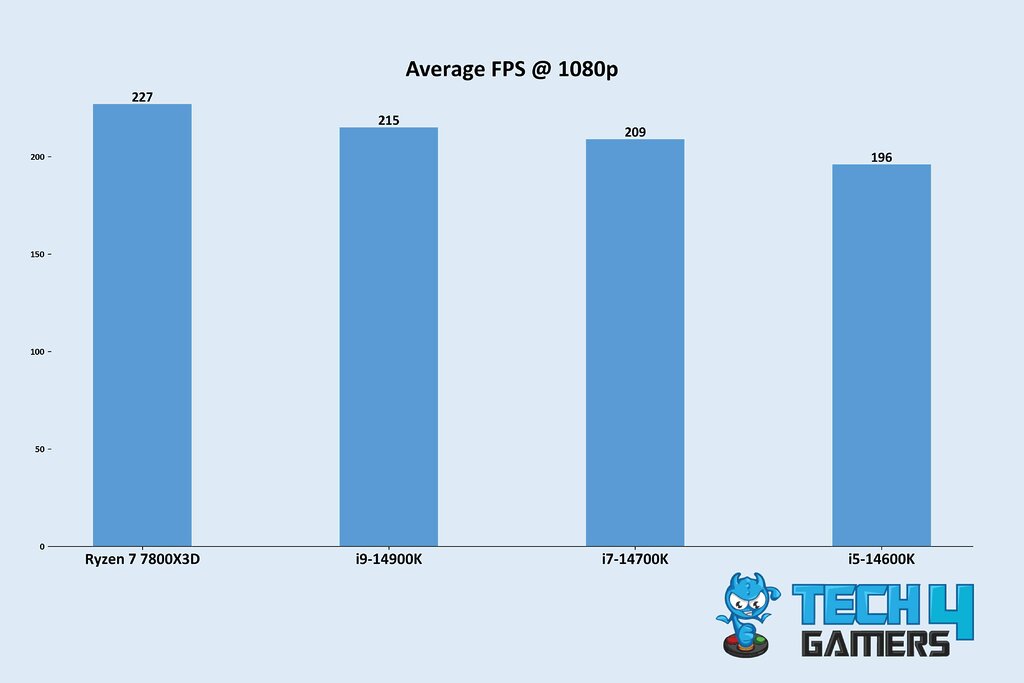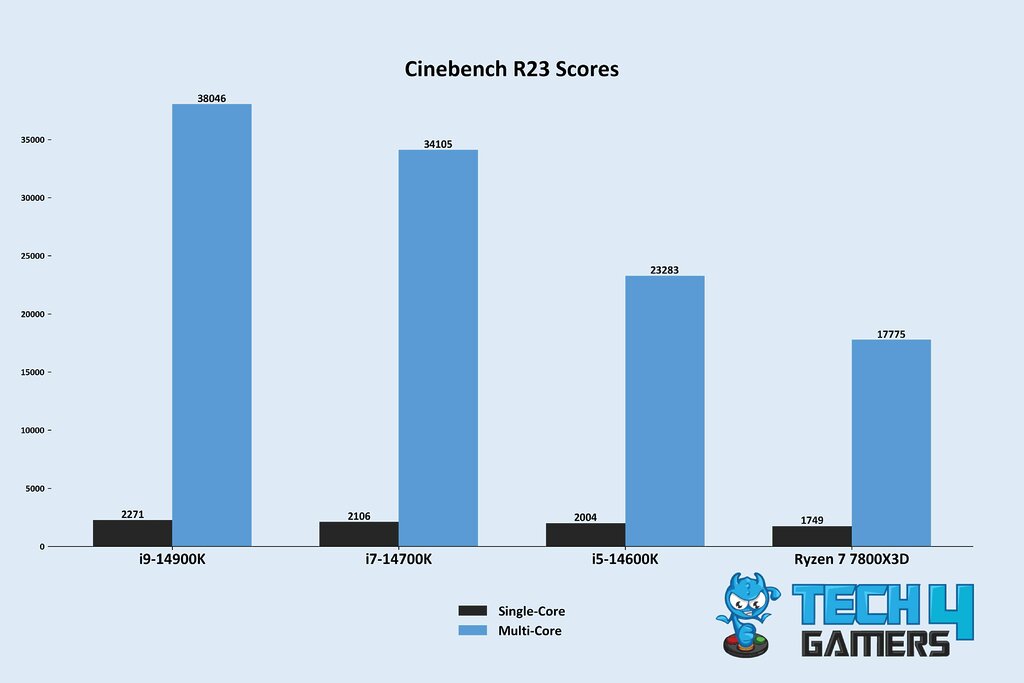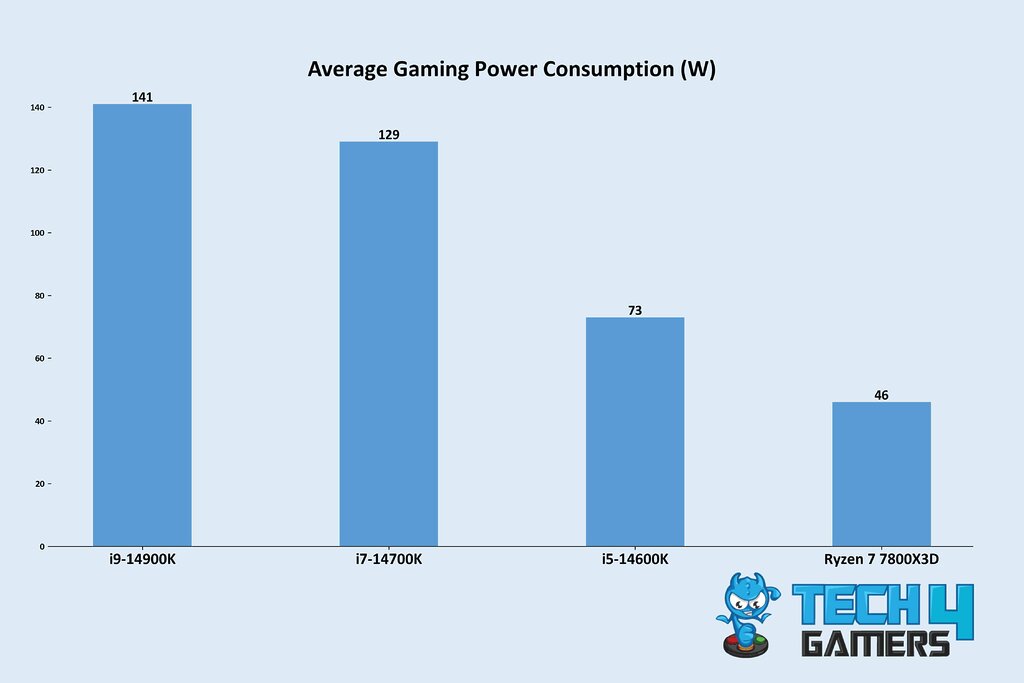- The 14900K loses against the Ryzen 7 7800X3D in gaming performance at 1080p.
- Intel’s flagship CPU has the highest power consumption out of all tested CPUs.
- Undervolting from 253W to 125W only slightly reduces the CPU’s performance.
When I first unboxed Intel’s flagship i9-14900K CPU, I expected unparalleled performance that couldn’t be beaten easily. I had the exact expectations while installing it in my testing rig, but soon, I was hit with the ground reality of the processor. The real challenges lay ahead of the CPU’s installation and performance, with its power and efficiency, which make me think that the i9-14900K is the most impractical CPU I have ever tested.
Real World Performance Results
The i9-14900K is Intel’s flagship CPU and performs as such in most applications. That’s why I gave it a test run in a few games and checked the CPU’s single-core and multi-core performance according to its power limits. Let me break it down further to showcase the CPU’s real-world performance, making me think the i9-14900K is the most impractical CPU I have tested:
Numbers Revealed: Gaming Benchmarks
I took out a few CPUs that can give the 14900K a run for its money with gaming at 1080p and loved the numbers I saw. From my gaming tests, it’s possible to dethrone the 14900K as the CPU king, as the Ryzen 7 7800X3D provides more performance. Don’t believe me? Check it out for yourself:

Here is a summary of the graph:
- The Ryzen 7 7800X3D is ~5.5% faster than the 14900K at 1080p, costing ~23.7% less. This is mainly due to the difference in the L3 cache in both CPUs.
- The 14900K and 14700K CPUs are almost evenly matched, with the latter using slightly lower power at 1080p.
- A difference in cores and higher power consumption doesn’t necessarily improve a CPU’s performance output.
Raising The Productivity Zone
The 14900K only loses in the gaming scene. In my books, when it comes to productivity, the CPU has no equal unless you decide to go with a Threadripper or Xeon equivalent. These are the scores the CPUs achieved in Cinebench R23:

Summarizing the graph, here are my key points:
- The i9-14900K tops the list by a massive lead over the other tested CPUs in the multi-core test.
- The 14900K used significantly higher power throughout the testing than the other CPUs.
- The performance difference in real-world scenarios such as photo manipulation, renders of high-quality videos, and 3D animation is minimal in all CPUs except the Ryzen 7 7800X3D.
The i9-14900K: A Power Hungry Beast
The 14900K’s power consumption was the first aspect that left me both impressed and perplexed at the same time. To explain, I compared the CPU’s average power consumption with its competitors, and the average power draw was ~29% higher than the 7900X3D in my testing. Here is a graph showcasing the results of my testing and worries:

The graph shows that all Intel 14000 series CPUs love power consumption. However, the i9-14900K tops the list with an average 141W power consumption in games. On the other hand, as I said before, the Ryzen 7 7800X3D performed almost ~5% faster during my tests and has a ridiculously lower average power consumption, drawing a clear line for the energy required to run AAA-titled games.
A Call To Undervolt The i9-14900K
Undervolting CPUs has been controversial, but high-end CPUs like the i9-14900K are begging to be undervolted. My tests showed an average 141W power consumption at 1080p gaming, but an undervolt from 253W to 125W resulted in only an 8% performance dip for me. On the other hand, the power consumption dropped to a remarkable 106W.
Undervolting the 14900K also lowered my CPU’s overall temperatures, which is difficult even for the best 360mm AIO coolers. Moreover, the lower thermals mean greater overclocking headroom, providing extra performance that would otherwise be missed.
For starters, I don’t know the reasoning for the higher 253W standard for the 14900K, which mainly makes it an impractical CPU for me. Also, while undervolting is slightly controversial, many others, such as JayzTwoCents, promote the practice for Intel’s 14th-gen CPUs.
Conclusion: A Titan For The Few
The 14900K is undeniably an outstanding CPU with remarkable processing power. Sure, I can use it for video editing, but the high power consumption, heating issues, and higher cost make the 14900K an impractical CPU for an average user like myself.
AMD’s 3D V-Cache CPUs are a better choice for gaming-only purposes. On the other hand, Intel’s flagship is a decent choice for productivity tasks. For the rest of us, it serves as a view into the future of CPUs, which is exciting but difficult to reach.
Thank you! Please share your positive feedback. 🔋
How could we improve this post? Please Help us. 😔
[Hardware Reviewer & Editor]
Meet Nauman Siddique, a highly experienced computer science graduate with more than 15 years of knowledge in technology. Nauman is an expert in the field known for his deep understanding of computer hardware.
As a tech tester, insightful reviewer, and skilled hardware editor, Nauman carefully breaks down important parts like motherboards, graphics cards, processors, PC cases, CPU coolers, and more.
- 15+ years of PC Building Experience
- 10+ years of first-hand knowledge of technology
- 7+ years of doing in-depth testing of PC Hardware
- A motivated individual with a keen interest in tech testing from multiple angles.
- I majored in Computer Science with a Masters in Marketing
- Previously worked at eXputer, EnosTech, and Appuals.
- Completed Course in Computer Systems Specialization From Illinois Tech
 Threads
Threads






